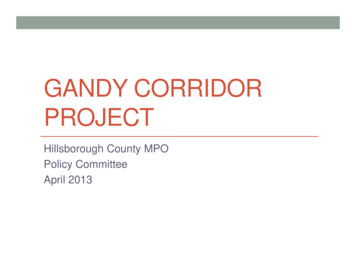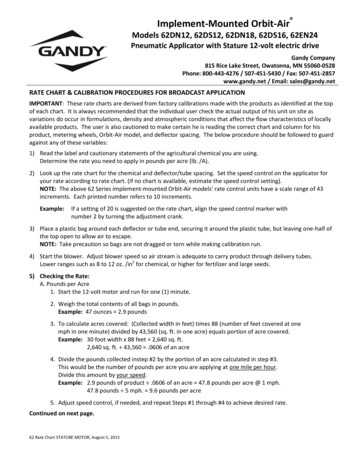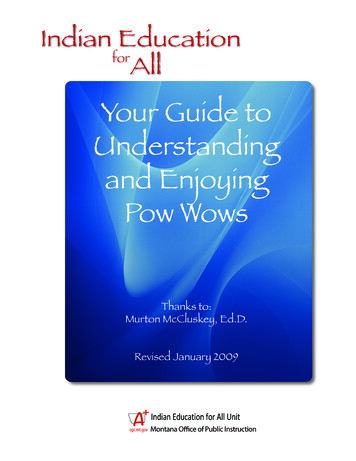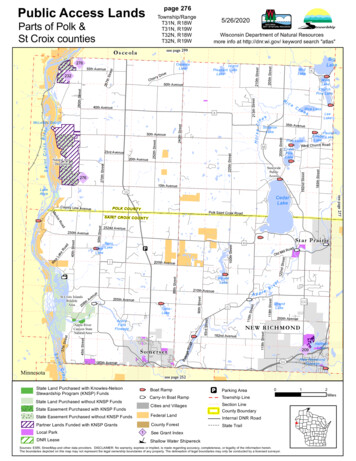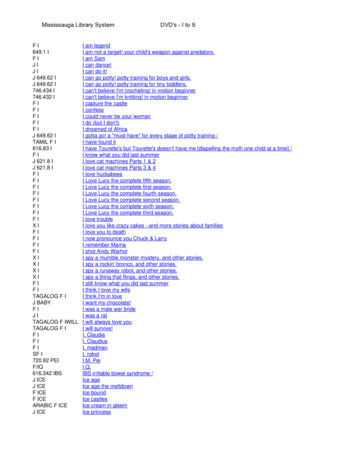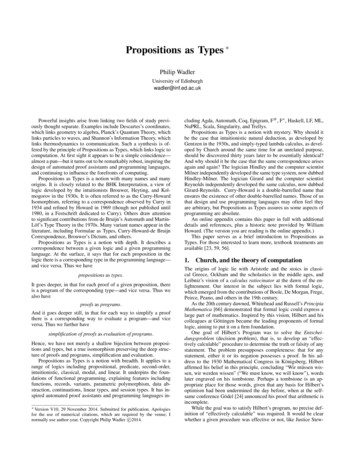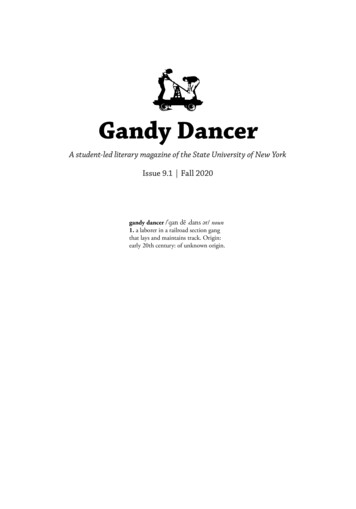
Transcription
Gandy DancerA student-led literary magazine of the State University of New YorkIssue 9.1 Fall 2020gandy dancer /ˈɡan dē ˌdans ər/ noun1. a laborer in a railroad section gangthat lays and maintains track. Origin:early 20th century: of unknown origin.
gandy dancer /ˈɡan dē ˌdans ər/ noun 1. a laborer in a railroad section gang that lays andmaintains track. Origin: early 20th century: of unknown origin.We’ve titled our journal Gandy Dancer after the slang term for the railroad workers who laidand maintained the railroad tracks before the advent of machines to do this work. Mosttheories suggest that this term arose from the dance-like movements of the workers, as theypounded and lifted to keep tracks aligned. This was grueling work, which required the gandydancers to endure heat and cold, rain and snow. Like the gandy dancers, writers and artistsarrange and rearrange, adjust and polish to create something that allows others passage. Weinvite submissions that forge connections between people and places and, like the railroad,bring news of the world.Gandy Dancer is published biannually in the spring and fall by the State University of New YorkCollege at Geneseo. Issues of Gandy Dancer are freely available for view or download fromgandydancer.org, and print copies are available for purchase. Special thanks to the Collegeat Geneseo’s Department of English and Milne Library for their support of this publication.issn: 2326-439Xisbn (this issue): 978-1-942341-75-8We publish writing and visual art by current students and alumni of the State University ofNew York (SUNY) campuses only.Our Postscript section features work by SUNY alumni. We welcome nominations from facultyand students as well as direct submissions from alumni themselves. Faculty can email RachelHall, faculty advisor, at hall@geneseo.edu with the name and email address for the alum theywish to nominate, and alums can submit through our website. Both nominations and directsubmissions should indicate which SUNY the writer attended, provide a graduation date, andthe name and email of a faculty member we can contact for confirmation.We use Submittable to manage submissions and the editorial process. Prospective authors cansubmit at gandydancer.submittable.com/submit. Please use your SUNY email address for youruser account and all correspondence.Gandy Dancer will accept up to three submissions from an author at a time.Fiction: We accept submissions up to 25 pages. Stories must be double-spaced. We areunlikely to accept genre or fan-fiction.Creative Nonfiction: We accept submissions up to 25 pages. CNF must be doublespaced.Poetry: Three to five poems equal one submission. Poems must be submitted as a singledocument. Format as you would like to see them in print. Our text columns are generally4.5 inches wide, at 11pt font.Visual Art: We accept submissions of art—especially photos, drawings, and paintings—in the file formats jpeg, tiff, and png. Submitted images should have a minimum resolutionof 300 dpi and be at least 5 inches wide. Please include work titles and mediums in yoursubmissions.Please visit us at www.gandydancer.org, or scan the qr code below.Questions or comments? Send us an email at gandydancer@geneseo.edu
Managing Editors Sara Devoe, Rebecca WilliamsonFiction Editor Kira BaranCreative Nonfiction Editor Marissa FilipelloPoetry Editor Nick WidmanPublic Relations Manager Sarah ChannelsFiction Readers Nathaniel Bedell, Bridget Cain,Jenelle Piatt, Lelia SassouniCreative Nonfiction Readers Salvador Galarza Pedraza,Valeria Guarneros, EthanPelletier, Cassandra PepePoetry Readers Emma Boskovski, Shakira Browne,Sarah Channels, Amina DiakiteFaculty Advisor Rachel HallProduction Advisor Allison BrownAdvisory Editors Dan DeZarn, Kristen Gentry, LuciaLoTempio, Courtney O’Gorman,Mehdi Okasi (SUNY Purchase),Michael Sheehan (SUNY Fredonia),Lytton Smith, Kathryn WaringFounding Editors: Emily Webb, Samantha Hochheimer, Emily Withers,Stephon Lawrence, Megan Nolan, D’Arcy Hearn, Jim Ryan, Megan Cicolello,Andrea Springer, Bibi Lewis, Jennie Conway, Suraj UttamchandaniSpecial thanks to: The Parry family, Sonya Bilocerkowycz
Dear Readers,Since 2012, Gandy Dancer’s mission has been to forge connections betweenwriters and artists, and in times of isolation and disrupted daily life, readingthese submissions certainly made us feel entertained and less alone. We havecontinued the production of our literary journal online due to COVID-19.We introduced new staff members to the journal, met in our editorial groupsvia Zoom and Google Suites, and crafted the layout on WordPress. Despitetechnical challenges, such as lagging Internets and learning how to use newprograms, we were able to put together an exceptional journal.This year, the first of a new decade, has featured a number of unfortunateand some eye-opening events, from the COVID-19 pandemic, to the BlackLives Matter movement, to the 2020 Presidential Election. Kailey Maher’ssculpture of toilet paper, “United We Stand, Divided We Fall,”speaks to thehardships of this fiercely divided time. As much as the events of this year havedivided us, they have also led us to seek connection through art and literature.For some, creativity has been the most promising way to cope with suchuncertainty, while others have found it harder than ever to find inspiration.We are grateful to those who submitted their art and allowed us glimpses ofhow they have coped.In many of the pieces collected here you will note a desire to return to thepast. In some work, this may include the past before COVID-19, the pastbefore the current political climate; in other pieces, one sees a longing forchildhood. Mick McMahon’s essay “Petrichor” explores how such longinglives in our senses and oftentimes demands a resurfacing. For McMahon,petrichor is “the memory of standing next to my grandmother on her porch,watching the rain fall as we sipped cups of tea. That is my home—that is mypetrichor.” This essay made us think of our own petrichors that remind us ofhome. In Julia Grunes’ story “Sunny Days,” the protagonist Edgar longs for atime before his family has put him in a nursing home. We sympathized withEdgar and his longing to relive old memories, especially since we’ve been putinto isolations of our own.There is also, running through these pages, a current of anger and frustration, a desire for change. In Isabella Higgin’s “June,” the speaker expresses herfrustration with America’s lack of change to her deceased father. She says, “Iam in lock step with people / who have had more than enough, who have had400 years / of lies to know to call this country’s bluff.” Reading “June,” we feelthis anger and sadness.Winosha Steele, too, highlights the importance of theBlack Lives Matter movement throughout her art, including “Ms. Bojangles”
on our cover and “Tether,” a portrait of a Black woman wearing a noose as anearring and a chain around her neck. These paintings remind us of a historythe country tries to make us forget, though the pain is ongoing for many. Asmuch as “Tether” is in conversation with the Black Lives Matter movement,it also speaks to the idea of gender and autonomy—or a lack thereof.In her essay about place and memory, Kathryn Waring explores the use ofvideo mapping. In “Searching for 360, she writes, “I am searching for a 360that doesn’t exist, a medium that lets me tell a story that’s not in fragments.What I don’t understand is that a photo, even in 360, is just a stage. Behindevery door there is a loaded gun; a crashed spaceship; a person casting a shadow. The most interesting part of a story is always just out of frame.” Eachpiece within this journal tells its own story. You will find stories here whichexplore identity, loss, the past, and change. We are grateful to the artists andwriters who have shared their stories and hope they will help you to feel lessisolated in this new and alien world.Cheers!Sara Devoe and Rebecca WilliamsonDecember 2020
Table of ContentsDearest Readers viiFICTIONMisty YarnallLooking for Home Julia GrunesSunny Days 948CREATIVE NONFICTIONMick McMahonPetrichor 1Malack Al-HaraizehFeast 19POETRYMiranda PhillipsDreams Under the Red Eye of a Hotel Television 3In a World Gone Shallow 5Sarah Holsbergwyd 7Abigail CorneliaYellow Light 17Molly R. SullivanLevonorgestrel 25Britt TrachtenbergIn Night 27Ellie CasterlineTo Bleed or To Cause Bleeding 28Kayla EylerA Ripening 31March 2018 32The Fairway Market Hostage Crisis 33
Mira JaegerWhimper 36Tanya KorichkovaBulgarian Soldiers Distributing Cigarettes to Turkish Prisoners 37Мушкато 39Mason MartinezQuenepas 40Isabella HigginsJune 47Jenna MurrayThe Fear that Left Me 60It Was Your Fault 62Kiel M. Gregory13 Days After, While at Work (4 October 2020) 65An Enquiry concerning Inessential Human Consciousness 67ARTJade NguyenPassenger (digital photograph) Reminiscence (digital photograph) In The Lane of Memory (digital photograph) Lauren BerkeyEye of the Beholder (photographic print) Self Portrait (photographic print) Kailey MaherUnited We Stand, Divided We Fall (mixed medium sculpture) Winosha SteeleTether (colored pencil on strathmore paper) Transfiguration (acrylic on canvas) Strength (acrylic on canvas) 82664183035444546BOOK REVIEWSara DevoeSonya Bilocerkowycz’s On Our Way Home from the Revolution:A Review 70
INTERVIEWRebecca WilliamsonAn Interview with Sonya Bilocerkowycz 73POSTSCRIPTKathryn WaringSearching for 360 78ABOUT THE AUTHORS 83Cover art: Ms. Bojangles by Winosha Steele
Gandy Dancer
CREATIVE NONFICTIONMICK MCMAHONPetrichorCalm quiet streets, dark clouded skies, and the cold smell of water hanging inthe air; this is petrichor: the scent of distant rain. A terribly romantic word,and one of my personal favorites. The Oxford English Dictionary definespetrichor as, “a pleasant, distinct smell frequently accompanying the first rainafter a long period of warm, dry weather in certain regions.” I define it ashome. Petrichor: the smell wafting through my window on October afternoons after school. Petrichor: the word my best friend loves so dearly thatwe wrote a poem about it together. Petrichor: the memory of standing nextto my grandmother on her porch, watching the rain fall as we sipped cups oftea. That is my home—that is my petrichor. And I must clarify, I don’t simply mean “the smell of rain”; no, I mean petrichor. I mean the distant smellof rain; the kind that falls in the early mornings or late afternoons; the kindthat hangs like a mist over northwestern pine forests; the kind you stand byan open window and sip a warm drink with. Petrichor has an entirely uniquecollection of connotations, separating it from being the smell of rain alone.It would be the same point as the instance of sirens versus mermaids; sure,they’re both most commonly denoted as half-fish people who sing to sailors,but most would much rather have a run-in with a mermaid than with a siren.Not myself, but most.I have always been, in the immortal words of my aforementioned bestfriend, a sentimental little SOB, supported only by my mindset that home isnot always a place. Home can be a person; it can be a memory. It can be thesound of a guitar with one loose string, the smell of apple cider and chowder,or even be sitting on the couch next to your best friend, playing Super SmashBros. And why is that? Shouldn’t home be a place, somewhere you live? Afterall, we do say, “I’m going home,” or “actually, I’m staying at home today.” Arethese phrases really nothing more than reflex? Well no, not for everyone atGANDY DANCER1
least. Home is where the heart is, after all, and for some people their heartslay inside a physical structure in which they live. For others, however, theirhearts lay with other people in other places. Their hearts lay in a dreamy past,in what was a better time, or in a place other than the structure they live in.Home is an idea, not a place, though the idea can, and often is, associated with a place. Home is a feeling of belonging, of being where you’remeant to be, and that can be found in anyone, anything, or anywhere. Formyself, petrichor is my home. It’s a scent that wraps itself around my mind,mingling with the memory of tea or coffee, decaying leaves, and the smellof my grandmother’s hand cream which I can only describe as warm. Thesame hand cream my own mother now uses. Petrichor is the link I share withmy best friend, the word they love enough to share with me, and the wordI now hold onto as a gift from them. If you ask my synesthesia, it’s a wordthat is blue, gray, and black, swirling together like a stormy sea—gray wavescrashing against rocky shores on a cloudy day, mist spraying all the way up theface of the cliff toward the pine forest overlooking the water. An absolutelybeautiful word to speak and see.That’s something about words people never seem to consider; how theylook. Is the word beautiful and pleasing to see? Do the images and sensationsthat latch onto it create a masterpiece? Is it the kind of word that only lookspretty in Times New Roman, or will Comic Sans do? Is it a pink, green, orblue word, or more of a gamboge? Now this adds an entirely new aspect ofwhether or not words work well when placed together; a green word and ablue word may look rather dashing together, but that green word belongswith a bright pink word. The words on the page become an amalgamation ofcomplementary colors that are paragraphs apart, and gentle ombrés forminga sentence. And regardless of the words’ arrangement, every page holds arainbow of colors and memories. Perhaps it’s a bit of an English major thingto do, to romanticize a word and give it an appearance, but if I’m meant tobe staring at hundreds of pages of words every week well, I might at leastmake it pretty.Petrichor is my home. It is my grandmother, my best friend, my favoritesmells, and all my favorite sights and feelings. It’s a word that incites a mixtureof immense joy and great calm within me. It feels pleasing when rolling offthe tongue. I never need to feel like I am lost or far from home, because petrichor follows me wherever my feet may land; all I need to do is wait for a bitof rain. And when a dark cloud holds promise and comfort, I find I have noneed to hold my breath and plead for sunny days. When you can find homein the storm, riding it out doesn’t seem so bad. When you can find home in afeeling, there will always be a place where you belong.2 Mick McMahon
MIRANDA PHILLIPSDreams Under theRed Eye of a HotelTelevisionAvocado ToastYou’ve made a bold move. It’s scary and everyone is asking you why.Trust yourself. Worst comes to worst, you can always cover it up.Yellow LightGun it, baby. Life’s too short.Elephant EarsYou wish for something soft and colorful in your life—consider buying aparakeet.But don’t teach it swear words.Gold EagleYou will finally be published by an up-and-coming publishing house.If sitting, you should skip town. Things aren’t going to end well.Flat TireDouble check before leaving: passport, wallet, toothbrush, underwear, date.GANDY DANCER3
LightningYou dream of power. The thoughts in your head ram into one another,creating static,bubbling energy—unharnessed capacity for greatness.RaindropsThe scent of a man fresh from the shower is intoxicating.MooseA man’s head may look pretty on the wall, but if his heart is still in sheddingseasonleave him in the wild. There’s no reason to pay the hauling fee.NeedleYou seek a form of correction in your appearance. Quit eating so manycookies.RailroadYou will leave in the dark without saying goodbye. The early morning moonwill guide you down the mountain pass and onto the plains before he evenwakes.FiretruckYour love life isn’t meant to be explosive, but rather a steady burning log in astone hearth. Children will snuggle down by your side to warm themselves.Embrace them gently.StarbucksYour next job will start at 7:00 a.m. You’ve been warned.VW BugYour goals need a mechanic, not a junkyard. Pick up a quart of oil, a newtoolbox, spare tire, and a few flares. The Redwoods are waiting.4 Miranda Phillips
MIRANDA PHILLIPSIn a World GoneShallowI see him across the parking lot,a rutted expanse flattened by a dodgy paving company,his wide eyes dartingabove an orange bandanaas he scurries toward the main entrance.A family of four explodesonto the sidewalk, laughing. Grabbing hands.He jumps, diverting pathslike schools of sardines ripplingaway from the shark’s open jaws.Shiny black hands pull on steel handles,ducking inside.Soon he sits across from me,body like a board.His gray eyes sinking.Ten feet apart, maybe twelve.I wave and point to the slender paper bagnext to my chair.GANDY DANCER5
He holds his up too, dropping the bandana insideas the nurse’s violet hands fit a light blue maskover his face. It’s only the two of us for nowwith our eyes closed and our plastic bagsthat should be clear and filled with fish,not neon yellow that drips poison into our chests.But more people trickle inand paper bags are creased,sagging closer to the floor each hour.One young woman coughs quietly. Ten pairs of shifty eyesand hidden faces jerk to glare. And suddenly, I realizewe’ve all turned into bank robbers.6 Miranda Phillips
SARAH HOLSBERGwydselling a beach house in idaho / lighting the sage and summoning spirits as I awaityour three character text / swimming in the east river / ruminating texting first /eating bacon after watching babe / looking up public campaign finance recordsto see where you donated to / craving mcdonald’s after watching super size me /looking up the names of your extended family on facebook / starting a cult in waco /hyphenating our last names / going to times square and getting dinner at tgi friday’s/ starting a jets fan club in buffalo / writing smut with you as my edward cullen /starting a beef plant in india / doing the twist in a 1950s soda shop / following youuntil you love me / blocking and unblocking you on social media / passing up ontaco bell after getting stoned / throwing a euro in the trevi fountain / sticking to thestatus quo after watching high school musical / getting a tramp stamp angel hearttattoo with property of [Y/N] written on it / fracking after watching erin brockovich/ since you’ve been gone I’ve been lost without a trace / picturing my belly swollen,pregnant with your child / selling cheeseburgers at the synagogue / wanting a stablerelationship after listening to lana del rey / presenting holofernes’ head on a silverplatter / taking my date to a classy dinner at olive garden / plucking the petals off aflower, whispering “he loves me, he loves me not” / witnessing the construction ofthe egyptian pyramids / maybe you think that you can hide, I can smell your scentfor miles / flushing my phone down the toilet / taking my grandma to a post maloneconcert / stealing pictures from an instagram influencer to catfish you with / gettingcompletely blacked out / composing a sonnet based on how little and useless yourreplies are / drinking the kool aid in jonestown / finding amelia earhart’s bones /cosplaying as junie b. jones / auditioning with “defying gravity” for the talent show /carving your ass out of marble / someday I’ll pay the bills with this guitar, we’ll haveit good / writing a poem about a three character message Read 1:32 AMGANDY DANCER7
Passenger (digital photograph), Jade Nguyen
FICTIONMISTY YARNALLLooking for HomeThe carpet is gone.The realtor’s heels click against the cherry-finished hardwood. “And this isthe master bedroom.”“Beautiful floor.” My toes budge at the tips of my sneakers. Once Ben andI buy the house, I’ll slip across this room as if ice skating, gliding in sock feetwith a wicker laundry basket on my hip. He’ll kiss me, folding work pants inthirds and adding them to a pile towering at the foot of the bed.“It’s just hardwood, Nelly.” Ben crosses his arms.My parents had an orange carpet in the bedroom. I vomited on it oncewhen I was four. Paper towels soaked up the raunchy mess. A stringy washcloth placed on the stain became a bridge to my mother. My feet squishedagainst the damp spot, and I awaited her invitation. She lifted her arm andthe covers rose. Once nestled beside her in the big bed, she pressed me intoher chest. The sheets always smelled like a woman.The bedroom is bigger than I remember. Maybe it’s because of the missingcarpet. There’s space to walk around now that the dresser and vanity are nolonger squished against the wall. It’s enough space for Ben and me to sharecomfortably—something malleable to recreate and make our own.At age eleven, I opened every jewelry box on my mother’s vanity. WhileI sat on the ottoman, her studs blinked in my ears in the mirror’s reflection.Lines of pearls bridged between my fingers. Her bra cups draped to my ribs.A stick of cherry-red lipstick sometimes found its way into my backpack inthe morning, marking my face in the girl’s bathroom before class.I open Dad’s closet, the biggest one in the house. It always served as theperfect hiding place.My father would count down from thirty in the kitchen. I lost myself inhis dress shirts and buried myself in a mountain of neckties.GANDY DANCER9
His cologne still stings the space. I want to step inside, to sit in the corneragain, and hide.I pull the light string. Empty.“Ben, look at all this closet space.”“Might be big enough for your shoe collection.”“We’ll have to tear down this wallpaper though.” The rose petal wallpaperis coarse under my fingertips. “I hate wallpaper.”The realtor leads us back into the hallway. The previous owners hung newdrywall and painted it red. My mother hated red. It made the house feel dark.This red was clean. There was no red on the molding—no red on the floor.When I was seven, my mother brought home long rolls of striped wallpaper marked with a yellow clearance sticker. She sprawled out on the livingroom floor with a straightedge and a pair of scissors. The paper hissed asthe blade dragged across. She bent around windows and outlets, cutting theperfect fit. There wasn’t enough to cover the whole room. It looked stupid,having one side of the room with the old paper and the rest new, but I didn’twant to paste over all the work I had done. I scraped bubbles out of the walls.My fingers got oily. It looked terrible.“Down here we have a second bedroom.” The realtor opens the door andI’m taken back.My childhood bedroom wallpaper is still there. Light green. I can stillsmell the vanilla bean candles on the walls.I tug on Ben’s arm. “This room is gorgeous.”“You hate wallpaper.”“This is subtle. It’s nice.”Ben shrugs.There are still swirls in the plaster ceiling. I used to imagine they weregalaxies. The tan carpet hadn’t aged in ten years.I hid on the far side of my bed when he told me, clawing at carpet fibers.My father’s heavy feet hit each step. A steady hand on the comforter, he easedhimself onto the floor beside me and told me we were moving. By we, hemeant him and me. My room had to be clean so the buyers wouldn’t see myclothes scattered across the floor. The books had to be shelved. Anything Icouldn’t find a spot for could be tucked into a dresser drawer. The house hadto sell.My father spent that afternoon in the garage painting slabs of white wooden molding. He carried the long beams up the stairs, the wood smacking thesteps behind him. A cup of nails clattered against my homework desk. I heldthe molding against the wall, and he hammered it into place.My bedroom was the first room in the house my mother renovated. Shewanted me to have a nice space for myself to grow up in. While pregnant,she and my father patched the ceiling with plaster, wallpapered the walls, and10 Misty YarnAll
stapled down new carpet. I was born before the molding went up. No roomin the house was ever finished.Kneeling against the wall, my father threw down the hammer. It crashedagainst the carpet. The section of molding was too long for the wall. He’dhave to pry it off, re-measure, and cut again.“Your mother ruined this house.”I sat beside him, tracing his calloused knuckles under my fingertip. It wasthe first time I saw my father cry. When I hugged him, his shoulders drooped,like my mother had destroyed him. By then, he had already asked her to leave.“Why don’t we head back downstairs now?” The realtor gestures back tothe door.The brass knob lingers in my hand. I remember Mom lying in bed withme, playing the alphabet game. Apple. Blueberry. Cotton candy. Doritos.She’d ask if I wanted to play another round, this time coming up with different animals. I smelled lavender body soap on her skin. It was almost as if shedidn’t want to sleep in her own bed. Sometimes I woke up next to her.I pull the door shut behind us.“Only one bathroom?” Ben traces the porcelain tile under his fingers.Brown water stains speckle the ceiling as if there had been a leak. I wonderif that was here before. Inside the medicine cabinet, I see faint dust marksfrom where pill bottles had sat for years.Before the move, I tossed old prescription syrups from childhood ear infections in the trash. I packed my father’s blood pressure medication in myshower bag. My mother left things behind—things my father and I wouldhave to clean out of the house. Lipstick tubes. Allergy pills. Makeup removerwipes. I swiped her things into the trash. They were dirty. The new familyshouldn’t have to dispose of them.“Yes, this is the only bathroom, but it has a shower and a bathtub, as wellas plenty of storage and fans.” The relator gestures to the vents on the ceiling.A single hair dangles from the fan.My mother’s hair marked its territory. Hair ties with her brown curls tangled in them. Hair snaked out of the bathroom drains. Hair tucked in theheat vents. I vacuumed what I could.Maybe her hair is still here.“One bathroom will be an issue if we ever have a family.” Ben peeks in atowel cupboard.“Let’s see the kitchen next.” I take his hand. The realtor is quick to takethe lead.The previous owners tore all the shelf paper out of the kitchen cabinets,but the border my mother stenciled around the room is still here.“We’ll have to paint over that.” I point at the border. I want all traces ofher erased. Paint over everything. Tear it all down.GANDY DANCER11
“Small kitchen.” Ben’s hand skims my hip.Mom elbowed the coffee maker when she rolled pie dough. Flour trailedbehind the microwave. The clunky, wooden cutting board stuck off the edgeof the counter. I sliced apples at the dining room table. Mom pulled out afolded apron from the buffet drawer. She looped the strings around my necklike threading a needle and knotted it at my waist like she was tying a corset.Mirroring the same motions, she secured an apron to her body.“What made you choose this house?” the realtor asks.“We haven’t chosen this house.” Ben squeezes my hip.“Just looking for home.” I place my hand over his, finding the gaps between his fingers.“It’s a great option. There’s a small grocery store just down the road. Greatschools, friendly neighborhood.”A real-estate sign pierced our front lawn where my mother and I used tohave picnic lunches on a checkered blanket. Tuna sandwiches on white bread.Potato chips. Watermelon squares. I mowed the grass for Dad. The smell ofgasoline and spring suffocated the air. The grass grew so long it masked thename of the realtor tasked with selling the property.Stepping off the mower, I tugged at the sign.I have to mow here.“I hear her mom kisses girls.” Two girls stood on the sidewalk.Teachers pulled kids aside at school and told them to take it easy on me.That I was from a broken home. Dad told me to ignore it. We’d be movingsoon. I knew he heard the same whispers at work. It made me feel like I finallyhad something in common with him.I ask the realtor, “Mind if we take a few minutes to talk?”I pull Ben into the living room. We stand under the ceiling fan like it’s mistletoe. I remember my mother standing on the back of the couch to changethe lightbulbs. My father scooped her off her feet and kissed her cheeks untilshe blushed. My mother had the prettiest smile.I wonder who will change the lightbulbs—me or Ben? Unless we pulldown the ceiling tiles and scrap the fan.“What do you think?” I bounce on the tips of my toes.“Serious?”“It needs a little work, but I can see us making this a home.”“A little work? Nelly, this house is ancient. The kitchen needs a wholeremodel, there’s wallpaper everywhere, and the master bedroom is tiny.”I wonder how we can arrange the bedroom to make it different from myparents. We can put the dresser next to the door, and the bed on the oppositewall. I can’t imagine having an orgasm in the same space my mother did.12 Misty YarnAll
“What about the house in Hannibal? That one was beautiful—modernand well-kept.” Ben leans into me, kissing my hairline. “I don’t think we’regoing to be happy in this house.”I wasn’t happy. I pushed everything off the kitchen counter. The floor waslittered with bruised apples and dusty flour. I took a bite out of an apple andspit it at her.“Nasty dyke.” I pulled my apron strings and tossed that at her, too.My mother wiped the chewed piece of apple off the front of her apron.“Nelly ”I rub Ben’s forearms, pinching the sleeves of his shirt. “It just needs someextra love. We have that. We can fix this.”“It’s going to skew our budget. I’m sorry.”Tears prickle my eyes. My parents and I sprawled across the living roomfloor, a Monopoly board between us. Bills of all colors tucked under thecardboard. My mother and father went back and forth; Dad pleading for ParkPlace, Mom eyeing Marvin Gardens. I bought the railroads and charged themevery lap around the board.“Sweetie?” Ben closes me in a hug. I look out the back door, where hergarden used to be. She had watchful gnomes scattered in the dirt. They’regone now.“It reminds me of home.” I sniffle.“You hated home.”“I hated my mother. I never hated home.”Ben traces my arms, rubbing my shoulders. “Ever since your mom passed,you’ve been obse
gandy dancer/ˈɡan dē ˌdans ər/ noun 1. a laborer in a railroad section gang that lays and maintains track. Origin: early 20th century: of unknown origin. We've titled our journal Gandy Dancer after the slang term for the railroad workers who laid and maintained the railroad tracks before the advent of machines to do this work.

